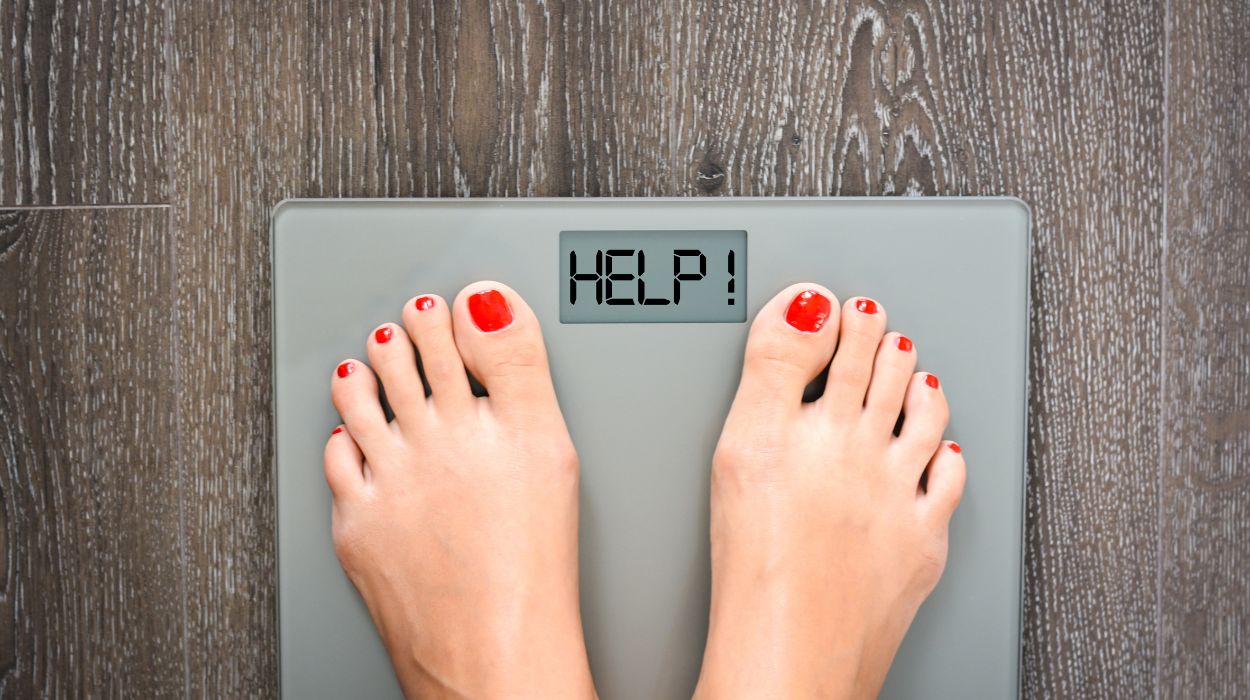Many women experience weight fluctuations during their menstrual cycle, with some noticing an increase in weight during their period. This temporary weight gain is a common symptom for many women and can be caused by a variety of factors, such as hormonal fluctuations, water retention, and food cravings.
So, let’s dive in and discover what causes weight gain during your period and how to manage it effectively. This article will explore the causes and treatments, including lifestyle changes and natural remedies that may help alleviate symptoms.
We will also look at some common misconceptions surrounding period-related weight gain and provide tips on how to maintain a healthy weight during your menstrual cycle.
Do You Gain Weight During Your Menstrual Cycle?
It’s normal for women to experience weight gain during their menstrual cycle due to hormonal fluctuations, fluid retention, and food cravings. On average, women may gain 3-5 pounds during their menstrual cycle, with weight fluctuations being most noticeable in the week leading up to their period. This temporary weight gain is usually nothing to worry about and should go away on its own as hormone levels normalize. Women can also experience other physical and emotional symptoms during their period, such as menstrual cramps, stomach cramps, and mood swings.
However, suppose weight gain is accompanied by severe abdominal pain or other unusual symptoms. In that case, it’s important to seek medical advice as it may be a sign of a more serious condition. In this article, we’ll explore the causes of weight gain during your period and some treatments to alleviate symptoms.
Why Do You Gain Weight During Your Period?

During your menstrual cycle, there are several reasons why you may experience weight gain:
Changes In Hormone Levels
Fluctuations in estrogen and progesterone levels can lead to water retention and bloating, causing you to gain weight. These hormones affect the way your body regulates fluids, leading to swelling in your abdomen, breasts, and hips.
Cravings Or Overeating
Many people experience food cravings or overeat during their period, especially for high-carbohydrate and high-fat foods. This can lead to consuming more calories than you burn, resulting in extra weight.
Salt Retention
Eating too much salt can cause your body to retain water, leading to bloating and weight gain.
Lack Of Physical Activity
You may be less active during your period due to cramps, fatigue, or other symptoms, which can lead to fewer calories burned and weight gain.
Temporary Edema Distribution
During your luteal phase, your body may experience temporary edema distribution, leading to water retention and weight gain.
Magnesium Deficiency
Low levels of magnesium have been linked to PMS symptoms, including weight gain.
It’s important to note that gaining a few pounds during your period is normal and usually temporary. However, if you experience significant or prolonged weight gain, it’s important to speak with your healthcare provider to rule out any underlying medical conditions.
Tips To Prevent Period Weight Gain

Some tips can help:
Lifestyle Changes
- Manage stress: Stress can cause hormonal fluctuations that can contribute to weight gain during your period. Try to manage stress through activities like meditation, yoga, or deep breathing.
- Get enough sleep: Lack of sleep can also cause hormonal imbalances and increase your risk of weight gain. Do your best to get between 7 and 8 hours of sleep (or more) each night.
- Getting regular exercise.
Healthy Eating Habits And Diet
- Avoid salty foods: Sodium can cause water retention, which can contribute to period weight gain. Try to limit your intake of salty foods during your period.
- Eat small, frequent meals: Eating small, frequent meals throughout the day can help keep your blood sugar levels stable and prevent overeating or cravings.
- Avoid alcohol: Alcohol can disrupt hormone levels and cause water retention.
- Drinking enough water.
By implementing these tips and making healthy lifestyle choices, you can reduce your risk of gaining weight during your period and maintain a healthy weight throughout the month.
How Much Weight Gain During Your Period?
The amount of weight gained during a period can vary from person to person. On average, women may gain 1-3 pounds during their period due to hormonal fluctuations, water retention, and other factors. However, it is important to note that this is usually temporary and should go away once the period is over. If you are experiencing excessive weight gain or are concerned about your weight, it is always best to consult your healthcare provider to rule out any underlying medical conditions. Additionally, maintaining a healthy diet, staying hydrated, and engaging in regular exercise can help prevent or minimize period-related weight gain.
Conclusion
In conclusion, weight gain during your menstrual cycle is a common occurrence for many women due to hormonal fluctuations, water retention, and food cravings. However, it is important to note that this weight gain is usually temporary and should not be a cause for concern.
Women should consider staying hydrated, exercising regularly, and maintaining a balanced and healthy diet to prevent or reduce weight gain. It is also essential to listen to your body and pay attention to any other symptoms that may indicate a more serious underlying condition.
Overall, gaining a few pounds during your period is a normal and natural part of the menstrual cycle. With proper self-care, women can manage and even prevent the effects of period-related weight gain.
Frequently Asked Questions
Yes, it is normal to gain a few pounds during your period due to hormonal changes and water retention.
On average, women may gain up to three to five pounds during their period.
Yes, regular exercise can help reduce water retention and prevent weight gain during your period.
It is okay to indulge in cravings in moderation but try to balance them with healthy options.
Drinking enough water, reducing salt intake, and staying active can help reduce water retention.
Some types of birth control can affect weight gain during your period, but it varies for each individual.
Yes, PMS can cause weight gain due to hormonal changes and cravings.
It is best to consult with a healthcare provider if you experience significant weight gain during your period to rule out any underlying medical conditions.
 Expert's opinion
Expert's opinion